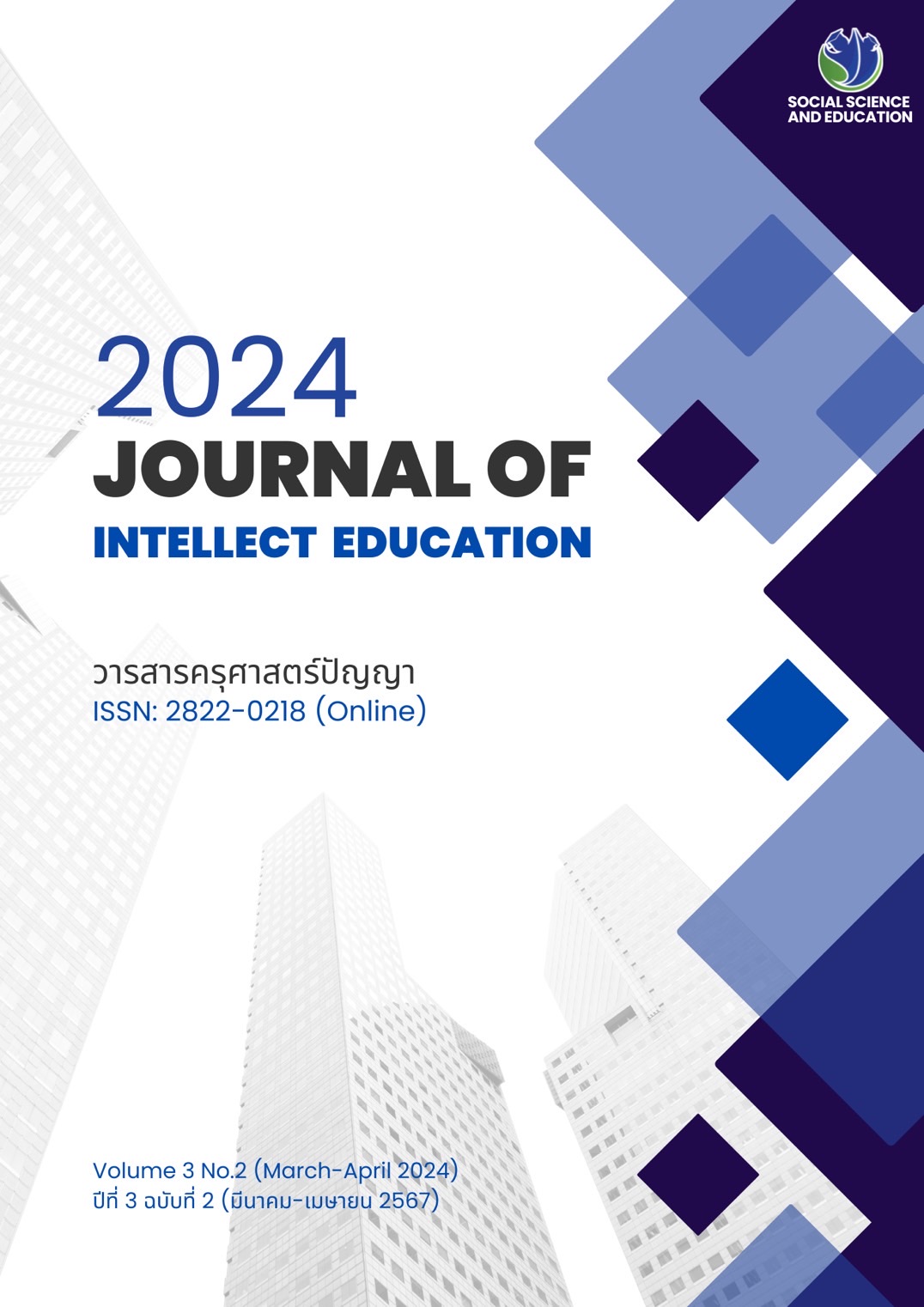THE LEARNING MANAGEMENT BASED ON HARROW'S INSTRUCTIONAL MODEL FOR PSYCHOMOTOR DOMAIN ON LEARNING ACHIEVEMENT AND PRACTICAL SKILL ON MAKING THAI DESSERTS OF GRADE 8 STUDENTS
Main Article Content
Abstract
The purposes of this research were: 1) to compare the learning achievement of the career learning subject area of grade 8 students between before and after learning management based on Harrow's instructional model for psychomotor domain; 2) to compare the practical skills of making Thai desserts of grade 8 students after learning management based on Harrow's instructional model for psychomotor domain with the criteria of 80%; and 3) to study students’ satisfaction toward learning using Harrow's instructional model for psychomotor domain. The sampling group used in this research were 28 grade 8 students, Songkhla Primary Educational Service Area Office 2, in second semester of 2023 academic year. The research instruments consisted of: 1) five lesson plans for career subjects using Harrow’s instructional model for the psychomotor domain on making Thai dessert; 2) a learning achievement test on making Thai dessert; 3) a Thai dessert practice skill test; and 4) a satisfaction assessment form. The data were analyzed using the mean, standard deviation, and t-test. The results of this research showed that 1) the learning achievement after learning management based on Harrow's instructional model for the psychomotor domain was higher than before learning, with statistically significant at the level of. 05. 2) Thai dessert-making practice skills of grade 8 students after learning management based on Harrow's instructional model for the psychomotor domain were higher than the criteria of 80% with statistically significant at the level of. 05. 3) the satisfaction of grade 8 students toward learning using Harrow's instructional model for the psychomotor domain was at a highest level.
Article Details
References
กิติพงษ์ แหน่งสกูล (2557). การพัฒนาผลสัมฤทธิ์ทางการเรียนและทักษะการปฏิบัติงาน เรื่อง การใช้โปรแกรมประมวลผลคำ กลุ่มสาระการเรียนรู้การงานอาชีพและเทคโนโลยีของนักเรียนชั้นประถมศึกษาปีที่ 6 โดยใช้วิธีสอนแบบชี้แนะร่วมกับรูปแบบการเรียนการสอนทักษะปฏิบัติของแฮร์โรว์. วิทยานิพนธ์ศึกษาศาสตรมหาบัณฑิต สาขาวิชาหลักสูตรและการสอน. มหาวิทยาลัยหาดใหญ่.
กระทรวงศึกษาธิการ. (2551). หลักสูตรแกนกลางการศึกษาขั้นพื้นฐานพุทธศักราช 2551.กรุงเทพมหานคร: โรงพิมพชุมชนสหกรณ์การเกษตรแห่งประเทศไทย.
ชัยวัฒน์ สุทธิรัตน์. (2559). 80 นวัตกรรมการจัดการเรียนรู้ที่เน้นผู้เรียนเป็นสำคัญ. (พิมพ์ครั้งที่ 7). นนทบุรี : พี บาลานซ์ดีไซด์แอนปริ้นติ้ง.
ทิศนา แขมมณี. (2560). ศาสตร์การสอน : องค์ความรู้ เพื่อการจัดกระบวนการเรียนรู้ ที่มี ประสิทธิภาพ.พิมพ์ครั้งที่ 7. กรุงเทพฯ: สำนักพิมพ์แห่งจุฬาลงกรณ์มหาวิทยาลัย.
นรนิติ พรหมพื้น. (2560). การพัฒนาทักษะการเขียนแบบเบื้องต้น ด้วยรูปแบบการสอนทักษะปฏิบัติของแฮร์โรว์ สำหรับนักเรียนชั้นมัธยมศึกษาปีที่ 6 โรงเรียนสวนกุหลาบวิทยาลัย นนทบุรี. การประชุมเสนอผลงานวิจัยระดับชาติ มหาวิทยาลัยสุโขทัยธรรมาธิราช ครั้งที่ 10. 34-45.
บุญชม ศรีสะอาด. (2559). การวิจัยเบื้องตน. กรุงเทพฯ: สุริยาสาส์น.
บุษยพงศ์ มุสิกไชย. (2553) การศึกษาเฉพาะบุคคลเป็นส่วนหนึ่งของการศึกษาตามหลักสูตร. บริหารธุรกิจมหาบัณฑิต. มหาวิทยาลัยกรุงเทพ.
ศรัณย์พร พูนสมบัติ. (2561). การพัฒนาเอกสารประกอบการเรียนโดยใช้กระบวนการเรียนรู้แบบ
เบรนเบสต์เพื่อพัฒนางานปั้นตามจินตนาการ สำหรับนักเรียนชั้นประถมศึกษาปีที่ 6. งานวิจัยโรงเรียนเทศบาลบ้านคูหาสวรรค์.
สุมิตรา อุ่นเปีย. (2557). ผลการจัดกิจกรรมศิลปะตามแนวคิดของแฮร์โรว์ที่มีต่อความสามารถในการปั้นของเด็กอายุ 9-11 ปี. วารสารอิเล็กทรอนิกส์ทางการศึกษา จุฬาลงกรณ์มหาวิทยาลัย. 9(1). 458-472.
สมเกียรติ จูรอด. (2564). การจัดการเรียนรู้กับทักษะที่จำเป็นสำหรับผู้เรียนในศตวรรษที่ 21. วารสารภาวนาสารปริทัศน์. 1(1). 25-36.
Harrow, A. (1972) A taxonomy of psychomotor domain: a guide for developing behavioral objectives. New York: David McKay.
Maslow, A. H. (1970). Motivation and Personality. New York : Harper and Row.

